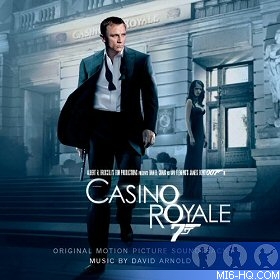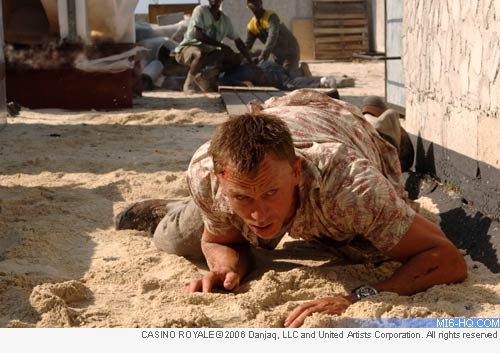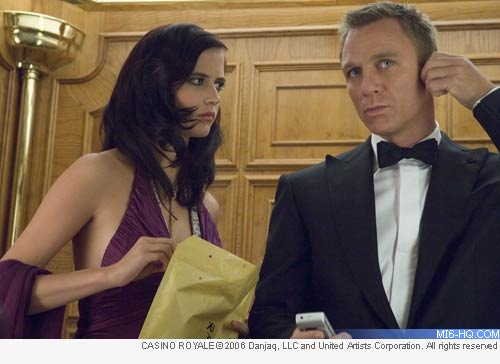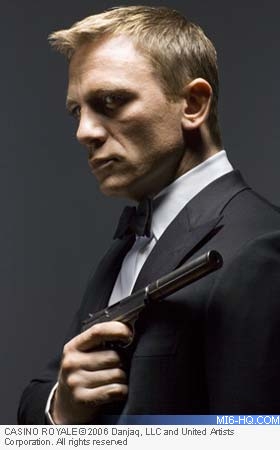 |
| |
Exclusive: MI6 recently caught up with James Bond
composer David Arnold to talk about his work on Casino
Royale.
|
|
In Conversation With David Arnold (1)
5th April 2007
Exclusive: MI6 recently caught up with James Bond composer David
Arnold to talk about his work on Casino Royale. In the first part
of this serialized interview, he talks about taking 007 back
to the beginning.
How did you feel about the challenge to
restart the series with “Casino
Royale”, both as an opportunity to refresh the style and
also to cut from what people expect?
Well I think that it’s interesting that people were talking
about “Batman Begins” – the whole reboot concept
of it, and of course reading the script, it wasn’t really
a reboot. You don’t get the childhood history you don’t
get that much background. He’s kind of appearing in scene
one, page one, reasonably fully formed as an agent. It’s
his finer faculties and his experience that he hasn’t got
yet – but he has no problem killing. He has no problem
doing the job in a mechanical way although the impact of the
first kill is obviously felt, so I knew we weren’t going
back to the first time that he ever saw a gun or the first time
that he ever drives a car and looking surprised at himself for
doing a three point turn.
| "It wasn’t
going to be a completely from the ground up construction,
but we
knew it was going
to be early days"
I
thought it was interesting speaking to Robert Wade and
Neil Purvis about what their process for writing was. Knowing
that it wasn’t going to be Pierce you could write to
the strengths of James Bond, so you could write to the strength
of the character rather than picturing Pierce doing the lines.
So we didn’t know who was going to be cast at that
point – it was a kind of a great mystery. But it
also made it potentially very exciting because everybody
who came
in was going to have to read these words and do the actions;
create something from these lines rather than take it off
where the last person left it. |
|

Above: US cover art for the soundtrack CD
 Order
CD (Amazon USA) Order
CD (Amazon USA)
 Order
CD (Amazon UK) Order
CD (Amazon UK)
|
That’s something perhaps
other actors have had to deal with. Even though artistically
and creatively we know that Daniel
has come post Sean Connery, Roger Moore and the rest, but of
course in the warped timeline that this universe exists in, there
have been no other Bonds. So that it’s a very bold decision
that Daniel made to kind of play it without looking over his
shoulder. But what was obvious was that the James Bond theme
couldn’t really be used because James Bond hadn’t
earned it at that point, he hadn’t become that character.
It was in the script from Day One and it was decided that we
weren't
going to use it.
 "...the James Bond theme couldn’t really be used
because
"...the James Bond theme couldn’t really be used
because
James Bond hadn’t earned it..." |
I had scored a few scenes and I did do it in scene order so
I started with the Parkour chase – I tried a couple of
things. I’d had a discussion with Sony fairly late in the
day about whether we should put the Bond theme in, and said that
I didn’t think it was a good idea because of what happened.
Every time you play it kind of dissolves any sense of drama,
dissolves any sense of real danger because when you hear that
theme you kind of sit back in your chair and you kind of wriggle
about and you smile to yourself and you kind of think, “great
how’s he going to get out of this? What’s he going
to do now?”
There are moments to enjoy the Bond theme and I think what was
great with “Casino Royale” was that you really didn’t
know whether he was going to get out of it. We have to believe
that perhaps he wouldn’t. Perhaps a couple of times he
obviously came close not to, but a couple of moments where he
did not necessary emerge from. In the African mission it was
considered to be a failure as far as that mission was concerned.
So if you start playing the Bond theme you’re
placing him in the wrong position, he will succeed and yet, during
the
film, he earns his stripes as a character. We play the kind of
DNA of it and that was kind of built into the title song as well,
the DNA of the Bond theme is to be found in the DNA of “You
Know My Name”.
 It felt like "I’m
coming and you better get out of my way"...
It felt like "I’m
coming and you better get out of my way"... |
It’s a complex deconstruction. It sounds like a fairly
simple song but if you analyze that alongside the original Bond
theme they are like first cousins. When he’s wins the DB5
in the card game against Dimitrios, when he earns one of the
Bond icons we give him some of the Bond music – just a
hint of it, so we know we’re getting closer. And when he
puts the tuxedo on in the bathroom with Vesper he earns a bit
more. When he’s in the fight at the end and he’s
finally beating everyone, he earns a bit more. Of course it’s
not till the very end that the banner unfurls and the curtains
draw and there he is. That was kind of the whole idea behind
it.
It frees you up in quite a way. It never felt right playing
it out with Daniel. Especially the “be-bop” section,
even the twangy guitar theme from the main riff couldn’t
get there till the end. I think that when Daniel is on the screen
and if you play that “be-bop” section that it would
of blown the whole thing out the water because I think it would
have made it feel just too trite. You know, it’s not a
trite piece of music and he’s not a trite character but
we played it when Pierce was paragliding and surfing in “Die
Another Day” and cutting his car in half with big chopping
blades. It had been used in some quite extravagant scenes in
a lot in recent films and I felt that it was important that we
put the distance between “Casino Royale” and the
extravagance of “Die Another Day” in particular.
It’s a funny business the Bond theme. It is one of the
greatest pieces of music in film and it is quite wonderful when
you hear it. But you know Daniel had to earn it, his James Bond
had to earn it. And I think that when you do get it, it’s
worth the wait.
At what point of the shoot did you start scoring the film?
Well I was working on the song while they
were still shooting in Prague. I’d been over to the
set a couple of times and I had a couple of ideas and I
had been talking to Martin Campbell
and talking to Daniel. He’s very interested in music
and I was talking to him about the feel of it and watching
to see how he was. It was while they were filming all of
the casino stuff – so he was buttoned up in those
sequences. He wasn’t running around fighting anyone,
so it was tense. We sat down while they were doing setups
and talked about just the feel of it and it felt like it
needed to be a song that kind of challenged people to come
and have a go which was the challenge that had been laid
down by those ridiculous tabloid headlines after the press
conference.
It was like someone has thrown down the gauntlet and we
needed to pick it up, fill it with something heavy and throw
it back. It felt like “I’m coming and you better
get out of my way”. It felt like it needed to be that,
it needed to be an unrelenting and push forward. We started
actually writing around mid June.
|
|
 |
Stay tuned to MI6 for more of the David Arnold interview...
Biography
David Arnold composed, arranged and produced the score for
Casino Royale, his fourth James Bond film, following
Tomorrow Never Dies, The World is Not Enough and Die Another
Day. As composer for Casino Royale, Arnold collaborated with
Chris Cornell to write the title song “You Know My Name.”
Hailed as one of the most successful young British composers,
Arnold began his film career making short films with fellow enthusiast
Danny Cannon, teaching himself to write, orchestrate and compose
the scores for their films. In 1993, he scored Cannon’s
feature film debut The Young Americans, combining lush orchestration
with Bjork’s vocals for the title song “Play Dead,” which
earned critical and commercial success. This led to the offer
to score Stargate, Roland Emmerich’s sci-fi film, which
enjoyed box-office success and earned Arnold his first BMI Award.
Winner of seven BMI Awards for his music for Tomorrow Never
Dies, The World is Not Enough, Die Another Day, Stargate, Independence
Day, Godzilla and 2 Fast 2 Furious, he also won a Grammy for
Independence Day and recently won the Royal Television Society
Award for the title music of the UK comedy series “Little
Britain.” In addition, he won the Ivor Novello Award for
the music for The World Is Not Enough. He has been recognized
by the film industry as a talented and diverse composer, arranger
and producer, whose
scores include Shaft, Changing Lanes, 2 Fast 2 Furious, The Stepford
Wives and, most recently, Michael Apted’s Amazing Grace,
Venus directed by Roger Michell, and Hot Fuzz directed by Edgar
Wright.
Related Articles
 Casino
Royale Coverage
Casino
Royale Coverage
 Casino
Royale Official Soundtrack - Preview
Casino
Royale Official Soundtrack - Preview
 You
Know My Name - Single Preview
You
Know My Name - Single Preview
 Chris
Cornell On Casino Royale
Chris
Cornell On Casino Royale
 Bond
Music
Bond
Music
Many thanks to David Arnold. Check out his official website
- www.davidarnold.com